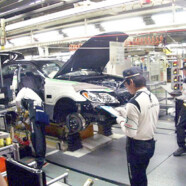Indonesia set to overtake Thailand as Southeast Asia’s biggest car market in 2014
Indonesia is set to overtake Thailand as Southeast Asia’s biggest car market as early as this year, driven by an expanding middle class and growing demand for budget, environmentally friendly vehicles, company executives and analysts said.
Auto sales in Indonesia, Southeast Asia’s largest economy, grew 17.8 percent in March from a year earlier, led by Toyota Motor Corp, Daihatsu Motor Co Ltd and Mitsubishi Motors Corp, data from industry association Gaikindo showed on Thursday.
This increase is more than double the revised 8.3 percent year-on-year growth in February, the same month that Thai auto sales fell 45 percent year-on-year, the most recent data from the Federation of Thai Industries shows.
Indonesia is set to benefit from companies looking to diversify their operations away from Thailand, where political uncertainty and floods have hit domestic demand and worsened its economic outlook.
“Our partners look at two big countries — Thailand and Indonesia. It’s probably because of the population,” Prijono Sugiarto, chief executive of Indonesia’s biggest auto distributor PT Astra International, told Reuters in a recent interview.
“Nowadays Indonesia is getting more popular. We are seen as one of the most potential countries in Southeast Asia,” Sugiarto said.
Domestic consumption accounted for more than half of Indonesia’s economy, which the central bank expects to grow at between 5.5 and 5.9 percent this year, one of the fastest paces in Southeast Asia. Indonesia is the world’s fourth-most populous nation, with some 240 million people.
Indonesia’s ambitions to be a regional manufacturing hub, however, could be hampered by its ageing, insufficient infrastructure and a power supply made unstable by decades of under-investment and bureaucracy.
Indonesia plans to add up to 60 gigawatts of electricity capacity to meet demand that is expected to roughly double by 2022, requiring a total of $125.2 billion in investment, an energy ministry official said last month.
Reconsidering Thailand
Vehicle sales in Thailand are expected to fall 11.7 per cent to 1.175 million in 2014 from a year earlier due to the political turmoil and post-election uncertainties, according to Frost & Sullivan, a market research and consultancy firm.
Sales in Indonesia, on the other hand, are projected to increase 6.5 percent to 1.31 million vehicles during the same period.
Thai auto sales slowed down in the first quarter of 2014, coinciding with rising concern over political unrest, particularly in the economic center and capital Bangkok, said Gustavo Colossi, vice president of sales and marketing for General Motors’ Southeast Asia operations.
“Meanwhile, automotive sales in Indonesia were quite healthy during the same period, and we expect that will have an overall positive impact on annual sales in the country and in the region,” Colossi added.
Toyota may reconsider investing up to 20 billion baht ($609 million) in Thailand and could even cut production if the political unrest drags on, the head of the Japanese automaker’s local unit said in January.
Some automakers, however, are choosing to ride out the slump in Thailand as they still see long-term growth potential in Southeast Asia’s second largest economy and a nation that is home to 67 million people.
“The country’s rich potential economic growth cannot be underestimated by a temporary disruption,” said Hiroyuki Yoshimoto, president of Nissan Motor’s Thailand operations.
The Japanese carmaker sees Thailand as a strategic regional base for production as well as research and development, with a second plant expected to be ready this year.
Source: Reuters / by Eveline Danubrata and Amy Sawitta Lefevre
(Additional reporting by Khettiya Jittapong in BANGKOK and Rieka Rahadiana in JAKARTA; Editing by Miral Fahmy)



